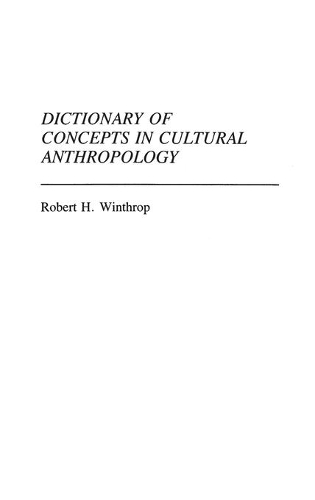
Dictionary of Concepts in Cultural Anthropology
(Hardback)
Publishing Details
Dictionary of Concepts in Cultural Anthropology
By (Author) Robert H. Winthrop
Bloomsbury Publishing PLC
Greenwood Press
18th November 1991
United States
Classifications
Tertiary Education
Non Fiction
Reference works
306
Physical Properties
Hardback
360
Description
The field of cultural anthropology describes and interprets the thought and behaviour of contemporary and near-contemporary societies. Inherently pluralistic, it offers a framework in which the distinctive perpectives of each cultural world can be appreciated. Robert Winthrop's dictionary describes the major concepts that have shaped the discipline, both historically and theoretically. It sets modern anthropology in its proper context within the broader intellectual tradition. 80 entries review the key concepts - culture, race, nature, symbolism, adaptation, the primitive, etc. - that have established the fundamental problems and issues, guided research, and served as the focus for debate in key areas of the discipline. The entries, which range from 2000 to 6000 words in length, are both thorough in treatment and contemporary in relevance. Some entries are primarily of historical significance while others describe recent developments. Each entry contains an annotated bibliography and a guide to additional reading on the subject. While this is not primarily a technical lexicon, many terms have been glossed and explained. Designed to be useful to students of anthropology, this dictionary will assist those in other disciplines to find their way through the anthropological labyrinth.
Reviews
This dictionary consists of 80 entries from 2000 to 6000 words in length that discuss key historical and contemporary ideas in cultural anthropology. The author is scrupulously fair and provides extensive bibliographies; however, annotations are often absent or perfunctory. The book is more specialized and more thorough than the typical dictionary of anthropological terms. Winthrop's choice of topics is somewhat idiosyncratic, however. There are entries for trance and for curing but not for sacrifice or medical anthropology; for semiotics but not for fieldwork or physical anthropology. Other lapses will occur to those who read the book; for example, the discussion of peasants doesn't include the term post-peasant, a useful concept. The book will be of interest to academic and larger public libraries but is probably fated to be used primarily by graduate students in their perennial quest to avoid reading the original sources.-Library Journal
Winthrop has produced an excellent compilation of important concepts in cultural anthropology. It is not a long list of terms. Rather, as is typical of volumes in this series, entries for each of the 80 concepts begin with a succinct definition, followed by an in-depth examination of the history and use of the concept in the discipline, a list of references discussed in the second part, and additional readings. The important ideas in British and American cultural anthropology are all included; the name and subject indexes guide the reader to more specific words and terms that relate to the concepts (e.g., "participant observation" is discussed under the concept "Ethnography"). There is good cross-referencing. Most of the cultural terms included in another notable work, Dictionary of Anthropology, ed. by Charlotte Seymour-Smith (CH, July '87), also appear in this dictionary. Winthrop's book is aimed at anthropology students and colleagues, including those in other disciplines, for whom it is indeed an excellent "guide through the anthropological labyrinth" (p.x). Recommended for all academic anthropology library collections, lower-division undergraduate and up.-Choice
The entries ring with clarity and authority.-ARBA
The entries ring with clarity and authority.ARBA
"The entries ring with clarity and authority."-ARBA
"This dictionary consists of 80 entries from 2000 to 6000 words in length that discuss key historical and contemporary ideas in cultural anthropology. The author is scrupulously fair and provides extensive bibliographies; however, annotations are often absent or perfunctory. The book is more specialized and more thorough than the typical dictionary of anthropological terms. Winthrop's choice of topics is somewhat idiosyncratic, however. There are entries for trance and for curing but not for sacrifice or medical anthropology; for semiotics but not for fieldwork or physical anthropology. Other lapses will occur to those who read the book; for example, the discussion of peasants doesn't include the term post-peasant, a useful concept. The book will be of interest to academic and larger public libraries but is probably fated to be used primarily by graduate students in their perennial quest to avoid reading the original sources."-Library Journal
"Winthrop has produced an excellent compilation of important concepts in cultural anthropology. It is not a long list of terms. Rather, as is typical of volumes in this series, entries for each of the 80 concepts begin with a succinct definition, followed by an in-depth examination of the history and use of the concept in the discipline, a list of references discussed in the second part, and additional readings. The important ideas in British and American cultural anthropology are all included; the name and subject indexes guide the reader to more specific words and terms that relate to the concepts (e.g., "participant observation" is discussed under the concept "Ethnography"). There is good cross-referencing. Most of the cultural terms included in another notable work, Dictionary of Anthropology, ed. by Charlotte Seymour-Smith (CH, July '87), also appear in this dictionary. Winthrop's book is aimed at anthropology students and colleagues, including those in other disciplines, for whom it is indeed an excellent "guide through the anthropological labyrinth" (p.x). Recommended for all academic anthropology library collections, lower-division undergraduate and up."-Choice
Author Bio
ROBERT H. WINTHROP is the principal of Winthrop Associates Cultural Research and an Adjunct Professor at Southern Oregon State College. He edited the 1990 book Culture and the Anthropological Tradition and contributed a chapter to Living with the Land and has published in Anthropology Quarterly.
